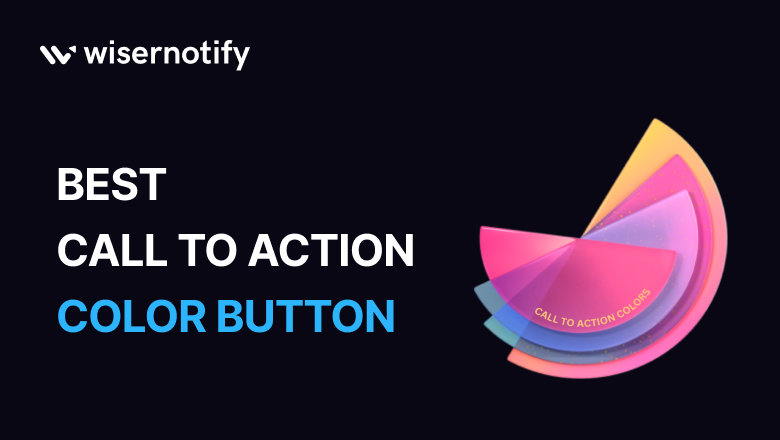The right call-to-action colors are key to improving profitability regarding landing pages, email marketing and website conversions. Colors matter for the CTA buttons and online users to grab their attention.
The CTA button can help you ask your readers to sign up for an event, make a purchase, or subscribe to a newsletter. But which colors will increase conversion?
When it comes to the best colors for call to action buttons, choosing the right one becomes crucial. In this blog, we explore the significance of colors in CTAs and how to choose the best color for a brand that can boost clicks and conversions.
Build trust & FOMO
Highlight real-time activities like reviews, sales & sign-ups.
The Significance of Color in CTAs
As we move further into the digital marketing age, ‘making a purchase’ is as easy as just clicking a button. And every click from your target audience brings more sales and conversions.
Not just sales, but a call to action button can influence your audience to take the desired action you want. That could be…
- Download a free resource
- Subscribe to a newsletter
- Add product to your cart
- Sign up for a trial
The color you choose for your CTA buttons invokes different emotions and impacts your reader’s decision. When deciding on a color scheme for your CTA buttons, it’s important to consider the connotations of that color. It all begins with understanding the impact of color on your conversion rates and sales.
Impact of Color on Conversion Rates
Colors impact how we interpret information; it depends on personal experiences and how customers react to every color. Each color on their screens sends out a subliminal message associated with your brand, so learning which color suits your marketing strategy best can be the difference between the campaign’s success or failure.
The call-to-action colors make the button more click-worthy and impact readers’ decisions. Once they visit your landing page or web design, the CTA button should almost feel like a no-brainer. The colors should evoke emotions, grab their attention, and influence user behavior to make the right decision.
Color psychology suggests that different colors evoke different emotions, influence perception, and impact customers’ behavior. In marketing and branding, color psychology impacts how customers perceive different brands and products, so it’s important to make sure the different shades of color align with your business goals.
Psychology Behind Popular CTA Colors
Your call-to-action buttons are prompts that influence your readers to take action. In addition, the colors give audiences an idea about the brand identity, psychologically create an image, increase the possibility of grabbing attention, and convey a direct message to the audiences.
The CTA button should be the same color throughout your entire website, making it easier for customers to recognize. The CTA button color can shape a brand’s perception, elevate people’s emotions, and ensure your brand remains at the forefront of your customers’ minds.
10 Great Colors for Call to Action Buttons
Selecting the most inspiring colors for your effective CTAs.
1. Red: Urgency and Excitement

The color red is the most assertive color. It generally shows urgency, excitement, and passion that is immediately recognizable. These are often used for buttons like “Buy Now” or “Limited Time Offers.”
Call-to-action buttons use red to empower shoppers to convert, as it creates a sense of urgency that increases conversion rates for impulsive purchases.
For example, the TEDX shows are popular worldwide. The red CTA button prompts action with the text “Reach out to learn more.”
2. Green: Approval and Comfort
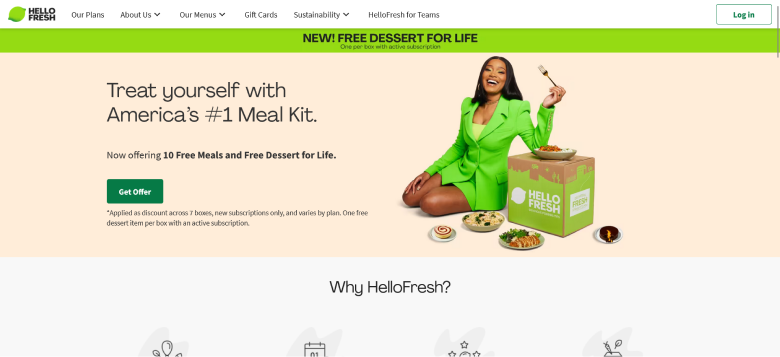
The green buttons are the color of nature that reflects balance, harmony, and refreshment. It is almost associated with natural and eco-friendly products and services. In addition, the color green conveys trust and is also effective for the finance sector.
The green button can increase conversion rates for positive actions like signing up or completing a purchase. If you have a white background, using a bright color like green can grab the user’s attention.
For example, Hello Fresh is a popular ready-to-cook meal kit delivery service that offers customers subscription services. The website displays a green CTA button reflecting the brand’s commitment to health-consciousness and freshness.
3. Blue: Trust and Security
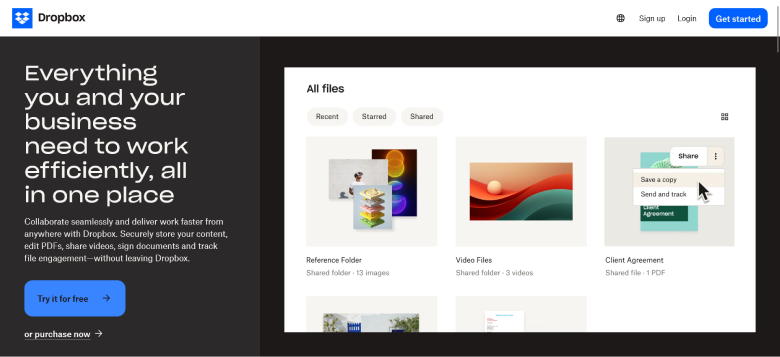
The color blue evokes trust, security, and reliability. Brands often use blue to build trust among the audiences, which helps them increase conversion rates and evoke positive emotions. It’s a professional choice often used by banks, healthcare, insurance companies, and tech companies.
For example, Dropbox uses the color theory. The blue CTA button with the text “Try it for free” builds trust and grabs audiences’ attention.
Build trust & FOMO
Highlight real-time activities like reviews, sales & sign-ups.
4. Orange: Confidence and Fun
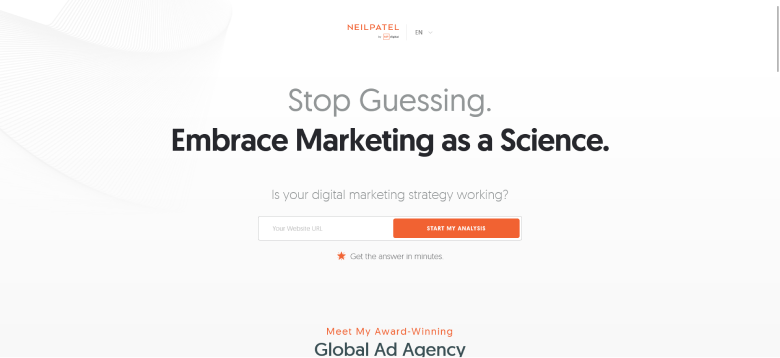
Orange buttons inspire movements and happiness that help the brand stand out by creating a sense of energy and enthusiasm. It helps to attract children and show cheerfulness and vibrance that grab the user’s attention.
For example, Neil Patel, a well-known agency, helps businesses grow their online presence and achieve their marketing goals. The orange CTA button with the text “Start My Analysis” influences audiences to analyze their marketing strategy for free.
5. Yellow: Optimism and Attention-Grabbing
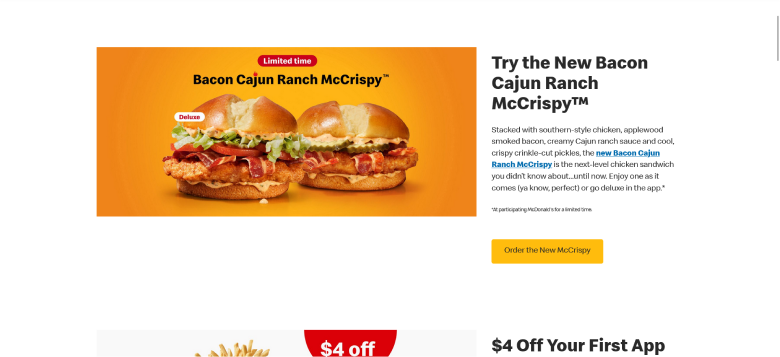
Yellow color is more about showing thoughtfulness, optimism, and attention-grabbing, making it one of the popular choices for a CTA button. Brand using yellow color for their identity portrays the emotions of positivity and creativity.
For example, McDonald’s uses a yellow CTA button with a personalized CTA, “Order the New McCrispy,” that influences customers, grabs their attention, and evokes the emotion of positivity among them.
6. Pink: Fun and Youthful
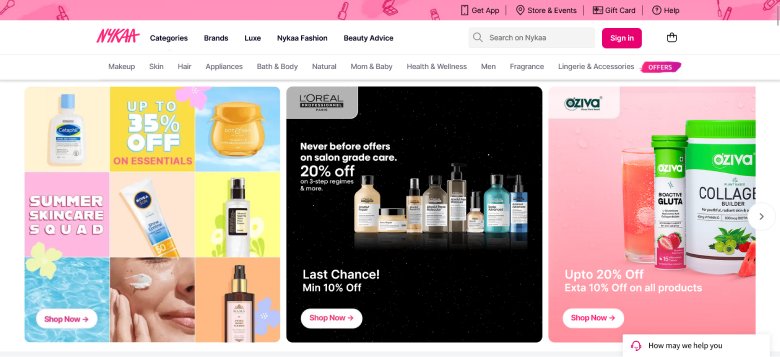
The pink color is often associated with romance, femininity, thoughtfulness, and tranquility. It’s most suitable for brands targeting female audiences, dating apps, wedding services, or romantic gateways.
For example, Nykaa uses pink color to grab the attention of female customers to influence them to make a purchase. The CTA color button uses pink text with white background highlights elements like “Shop Now” and “Sign in,” making the page look more charming.
Build trust & FOMO
Highlight real-time activities like reviews, sales & sign-ups.
7. Purple: Creativity and Luxury
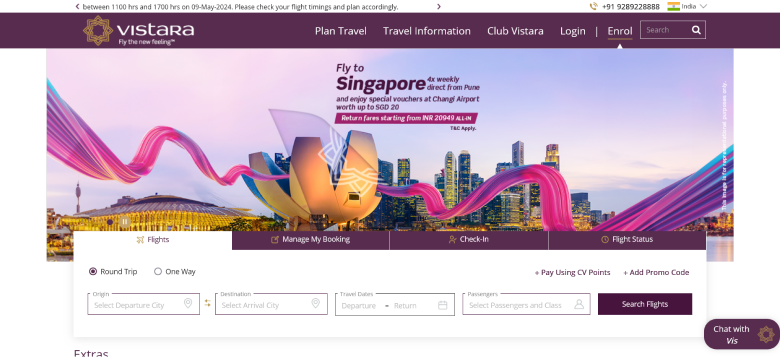
Purple is a versatile color often associated with luxury, vision, and royalty. It gives the CTA button a sense of uniqueness and conveys sophistication and exclusivity to stand out from your competitors. It is most suitable for brands in the arts, design, or innovative sectors.
For example, Vistara Airlines uses a purple CTA button that lends the airline a touch of royalty.
8. Black: Sleek and Powerful
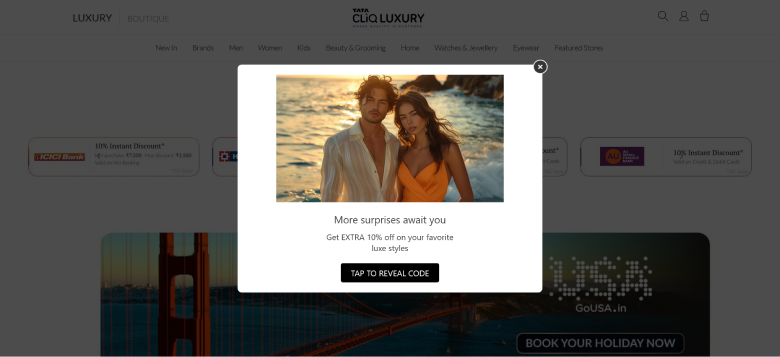
Black is another versatile color that is associated with sophistication, elegance, and authority. When used in CTAs, black can convey a sense of luxury, exclusivity, and professionalism. It’s a bold choice used by luxury brands or high-end services/products.
For example, Tata CLiQ Luxury uses a black CTA button with the text “Tap to Reveal the Code,” influencing customers to grab 10% off on their favorite luxe styles. It creates a sense of exclusivity and privilege among the users.
9. Grey: Neutral and Calm
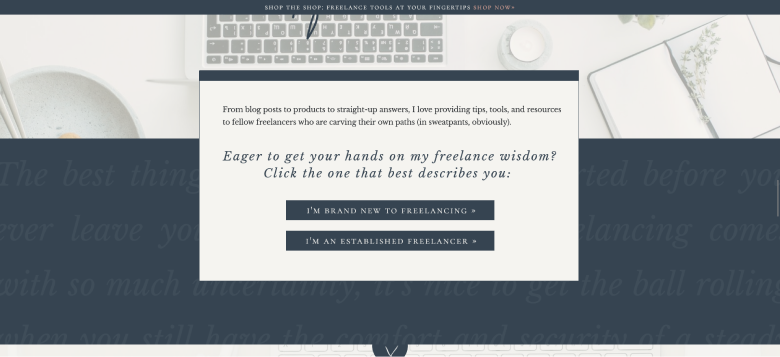
Grey is a neutral color that conveys balance, professionalism, and modernity about the brand. When used in CTA, it creates a sense of calmness and trustworthiness among the customers. The lighter shades of grey can evoke a sense of sophistication and modernity.
For example, Kat Boogaard, a freelance writer, uses a Grey CTA button that builds calmness and trust among the customers. The CTA text influences Freelancers to take the next step in their freelancing journey.
Build trust & FOMO
Highlight real-time activities like reviews, sales & sign-ups.
10. White: Pure and Simple

White CTA buttons typically convey simplicity, cleanliness, and clarity that enhance the overall look and feel of your website. The white color aligns with the clean and minimalist design trends that are popular while maintaining a modern and professional appearance.
For example, Wix, a platform that helps you build a website with lots of customization options available, uses a white CTA button. The CTA button with white color and text “Get Started” shows a clean and aligns with the minimalist design of their website.
Best Practices for Choosing CTA Colors
To convert your Call to action button need to stand out from the rest of your design. While there is no perfect color that leads to higher conversion rates, running A/B testing using different colors can be a way to optimize your designs.
Here are a few ways to try out.
Use Brand Colors: Choose colors for your CTA that align with your brand’s color, identity, and guide styles. Brands often choose a color that establishes a cohesive connection throughout the email, website, and landing page. This helps boost brand awareness and recall.
Keep your CTA color Consistent: Subscribers often associate specific colors with actionable items; hyperlinks are often associated with blue. Assigning one color for your primary CTA and another for secondary CTAs can help your readers on the same page. In addition, make sure to keep your call-to-action colors consistent on different communication channels and platforms.
Contrasting color with Background: Make sure your chosen color stands out against the background of your web page or email. High contrast color ensures the CTA button is easily visible and grabs the user’s attention. Changing your CTA button colors to give them more contrast against your website page creates more visibility, leading to higher conversions.
Consider Audience Preferences: Understand target audiences’ preferences and cultural associations with different colors. Different colors might have different meanings in different cultures or regions.
Test your CTAs: Not only is one color always better or more effective, but brand style and other factors can vary the impact accordingly. So, set your call-to-action colors after A/B testing multiple variants and find what color converts higher than the other.
Conclusion
The best call to action uses the color combinations that help your brand increase your average conversion rate. If your brand’s primary color is a bold one, you can use a complementary color for your secondary CTA button to make customers differentiate and make the CTA buttons stand out.
In addition, one recent design trend is to make CTA buttons transparent. These are called “ghost buttons,” and they are effective at drawing the attention of your target users and improving conversion. The button colors can shape your brand, brand identity, and brand perspective and can help you with conversion optimization.
Using warm, calming, and mixed colors can help boost sales, increase engagement, and maximize conversion.
